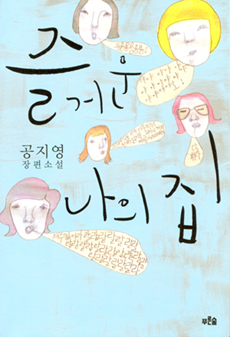
Gong Ji-young, who inaugurated the era of feminist literature in Korea, has published her eighth novel, My Sweet Home. Her novels have always become a talk of the town and this, her newly-released work, also became a bestseller as soon as it was published.
My Sweet Home is a family novel. However, the family is unacquainted with other families. Contrary to other ordinary family images, My Sweet Home is unfamiliar. For example, in this family, the existence of the father is absent from the home. That's why My Sweet Home attracts people's attention in that it helps mediate a new family image in this changing world. My Sweet Home awakens people to understand and retrace the meaning of a family.
The story of My Sweet Home begins with an eighteen-year-old Wi-nyung when she leaves her father and her stepmother. She goes to her real mother's home to spend her rest time of teenage with her real mother, and after one and a half year, Wi-nyung finds out a new meaning of a family. Most of all, she looks back upon her self and cure her wound by herself and recognizes the meaning of a family and her identity, escaping from the state of her mental disorder. In other words, My Sweet Home displays all feelings every family has experienced through the emotion of happiness or sadness.
My Sweet Home seems to reflect Gong Ji-young's own life in many ways. As a successful female writer, Gong Ji-young's private family life was not happy; She got divorced three times, and she now has three children who have different family names to one another. Naturally, her desire to overcome the sadness in her family life is well displayed through the mental growth all the characters in My Sweet Home go through.
Finally, My Sweet Home has chameleonic colors in the sense that it can be a family novel or growth novel, or a self-examination novel through which we can find the power of Gong Ji-young's talented writing and also the true meaning of a family.
Ryu Ji-youn
KMG Reporter
whitefox11@kmu.ac.kr
KMG Reporter
whitefox11@kmu.ac.kr








